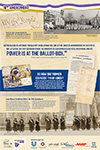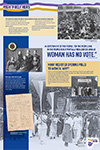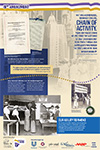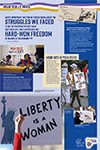On Exhibit: Struggle for Full Voting Rights
Virtual and In-Person Exhibit
 |  |  |  |
| Poster 1 | Poster 2 | Poster 3 | Poster 4 |
[Exhibit has closed.] Mortvedt Library is hosting a new popup exhibition from the National Archives, Rightfully Hers, “commemorating the 100th anniversary of the ratification of the 19th Amendment. Rightfully Hers explores the history of the ratification of the 19th Amendment, women’s voting rights before and after the 19th Amendment, and its impact today. Despite decades of marches, petitions, and public debate to enshrine a woman’s right to vote in the constitution, the 19th Amendment – while an enormous milestone – did not grant voting rights for all” (source: National Archives press release for Rightfully Hers). Click the links above to see large images of the posters on exhibit in the library lobby.
The right to vote has been denied to people based not only on gender and race, but based on other qualification/disqualifications, such as the intersection of gender and race with citizenship (who counts as a citizen?), land ownership (who owns real estate? how much real estate qualifies?), religion (e.g., in various states Baptists, Catholics, Quakers, and non-Christians were banned from voting), age, and literacy.
“Following the 2016 election, the fight for voting rights remains as critical as ever. Politicians across the country continue to engage in voter suppression, efforts that include additional obstacles to registration, cutbacks on early voting, and strict voter identification requirements” (source: American Civil Liberties Union https://www.aclu.org/issues/voting-rights).
While the physical exhibit resides in the Mortvedt Library lobby, here on the web we’ve added links to Open Access resources on the topics of 15th Amendment (Black men’s right to vote), 19th Amendment (White women’s right to vote), and the Voting Rights Act of 1965 (securing Black, Latinx, and Asian women’s right to vote and Indigenous peoples right to vote). The Voting Rights Act of 1965 also made it illegal to use poll taxes, literacy tests and intimidation to prevent people from voting — these tactics had been used in many states to suppress voters who had the legal right to vote.
To mark the anniversary of the 19th Amendment, The New York Times ran a series of articles that highlighted the work and activism of lesser-known women who were crucial to the fight in how women won the right to vote in the United States. For an open access list of the articles, see https://www.nytimes.com/spotlight/women-suffrage-100. Here is an article from the New York Times, Meet the Brave but Overlooked Women of Color Who Fought for the Vote. For a full range of Times articles, see PLU Library’s New York Times database (ePass required).



Social Media